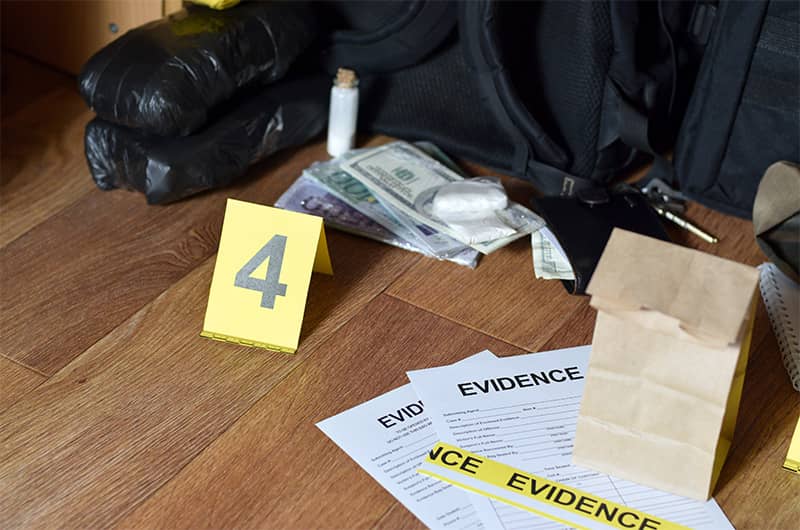Can the Police Search Me Without a Warrant in a Drug Investigation?

If you’re involved in a drug investigation, or even if you’re just in the wrong place at the wrong time, you might wonder what rights you have when it comes to police searches. Do they need a warrant to search you? The answer isn’t always black and white.
While the Fourth Amendment protects against unreasonable searches, there are situations where police can search without a warrant. Let’s explore when they can—and can’t—search you during a drug investigation.
The Fourth Amendment and Reasonable Searches
Let’s start with the basics. The Fourth Amendment to the U.S. Constitution protects against “unreasonable searches and seizures.” This means that, in general, police need probable cause and a warrant to conduct a search.
However, the key word here is “unreasonable.” Over time, courts have carved out several exceptions to the warrant requirement, finding that in certain situations, a warrantless search may be considered reasonable. Many of these exceptions come into play frequently in drug cases.
Common Exceptions to the Warrant Requirement
Here are some of the most common scenarios where police might search you for drugs without a warrant:
1. Consent
One of the most straightforward exceptions is consent. If you voluntarily agree to let the police search you, your vehicle, or your property, they don’t need a warrant. However, it’s important to know that you have the right to refuse consent, and doing so does not give the police probable cause to search.
Be aware that police may try to pressure or trick you into consenting. They might say things like, “If you have nothing to hide, you shouldn’t mind us taking a look.” Don’t fall for it. Politely but firmly assert your right to refuse consent.
2. Plain View
If police see drugs or paraphernalia in “plain view,” they can seize the items without a warrant. The key is that the officers must be lawfully present in the place from which they spot the contraband. They can’t break into your home and then claim anything visible is fair game.
For example, if you get pulled over for a traffic violation and the officer sees a baggie of cocaine on your passenger seat, that would likely fall under the plain view exception. But if the drugs are hidden in your trunk, the cop can’t pop the trunk open without probable cause or consent.
3. Search Incident to Arrest
If the police have probable cause to arrest you, they can search your person and the area within your immediate control incident to that arrest. The idea is to protect officer safety and prevent the destruction of evidence.
So, if you’re arrested on suspicion of drug possession, the police could empty your pockets and search your backpack without a warrant. But they couldn’t rifle through your whole house unless they had probable cause to believe there was evidence of a crime inside.
4. Exigent Circumstances
In emergency situations, police may conduct a warrantless search to prevent the imminent destruction of evidence or address an immediate threat to public safety.
For instance, if officers are chasing a fleeing suspect and see him toss a bag of drugs into a dumpster, they could search the dumpster without a warrant to recover the discarded evidence. Or if police get a 911 call about an overdose victim in an apartment, they could enter without a warrant to render aid.
5. Vehicle Searches
Police have more leeway to conduct warrantless searches of vehicles than homes due to the “automobile exception” to the warrant requirement. This is based on the idea that cars are inherently mobile, so evidence could be quickly driven away if officers had to wait for a warrant.
If police have probable cause to believe a vehicle contains evidence of a crime, they can search the entire vehicle and any containers inside that might hold the suspected evidence. However, they can’t search a vehicle without probable cause just because they pulled you over for a minor traffic violation.
Challenging an Illegal Search
If you’ve been charged with a drug crime based on evidence from a warrantless search, don’t assume the search was legal. A skilled criminal defense attorney will closely scrutinize the circumstances of the search to determine if police overstepped their bounds.
Some key questions to consider:
- Did the police have a valid reason to stop or detain you in the first place?
- Did they improperly pressure or coerce you into consenting to a search?
- Were the items they claim were in “plain view” actually hidden from sight?
- Did they exceed the lawful scope of a search incident to arrest or vehicle search?
- Were the circumstances truly “exigent,” or did they have time to seek a warrant?
If your attorney identifies an unlawful search, they can file a motion to suppress the improperly obtained evidence. Under the “exclusionary rule,” any evidence derived from an illegal search typically can’t be used against you in court. This can be a powerful defense tool that may lead to charges being reduced or dismissed.
Protecting Your Rights During a Drug Investigation
If you’re facing drug charges and believe you were subjected to an illegal search, it’s crucial to discuss the details with an experienced criminal defense lawyer. A knowledgeable attorney can assess the specifics of your case, determine the most strategic challenges to raise, and fight to vindicate your Constitutional rights.
At the Nieves Law Firm, we have extensive experience tackling illegal searches in drug cases. We know how to hold law enforcement accountable and work tirelessly to get unlawfully obtained evidence suppressed.
If you’re facing drug charges in California, don’t wait to get help. Contact our office today for a confidential consultation. We’ll listen to your story, explain your options, and mount a defense designed to secure the best possible outcome. With your freedom and future on the line, put our skilled team in your corner.



